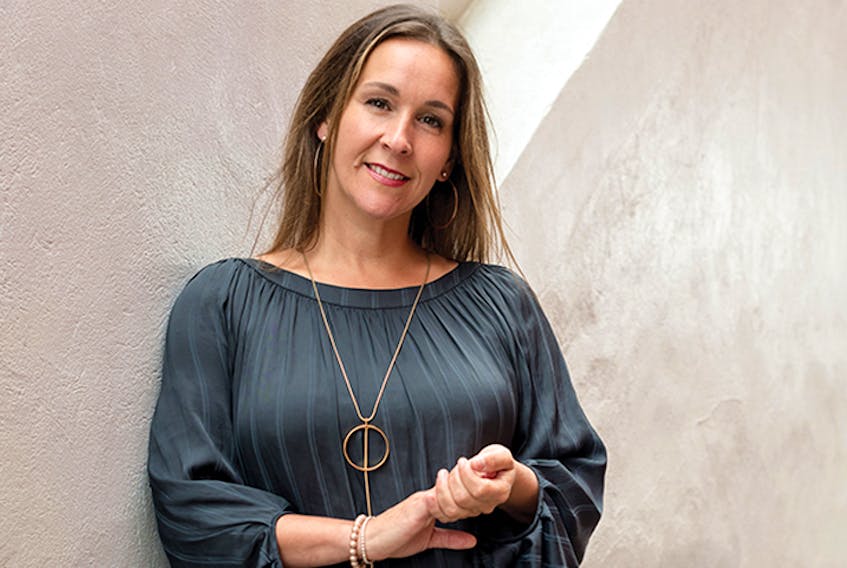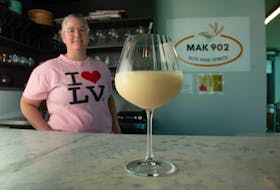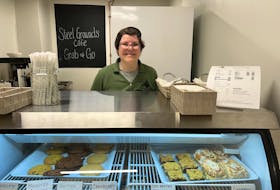It was a simple childhood.
Growing up in a small Acadian village in southwestern Nova Scotia, Dawn Pottier read books, played outside and sewed.
She sewed a lot.
“I didn’t know what fashion design was but I remember trying to design outfits out of bed sheets to make myself cool clothes,” Pottier says. “There was no cable … I believe in that type of childhood because it allowed us to be creative.”
Her upbringing, surrounded by traditional handiwork like knitting, quilting and sewing, would lead Pottier to launch Lulujo Baby in 2008, now one of the best-known baby brands in the country.
DIY project becomes big business

The New Brunswick-based company sells products through thousands of big and small retailers – both online and in brick and mortar stores – in more than 40 countries, including in fast-growing markets in China and the United Arab Emirates.
Lulujo recently partnered with award-winning author Sheree Fitch to produce board books for a new collection of Waldorf-style soft dolls, and the company’s blankets are often spotted wrapped around the babies of celebrities.
The idea for the company started while Pottier was on maternity leave with her second child. She wanted a baby carrier, but couldn’t find what she was looking for. So she sewed a homemade sling to carry her daughter.
Her friends raved about it. Strangers stopped her on the street to ask where she got it. On a whim, she went to a store in her new home of Fredericton, N.B., to see if the retailer would carry her slings.
When our client @lulujobaby's products are on @TheEllenShow, you know they've made it big! Actor Kate Hudson’s little Rani Rose loves her Lulujo blanket. Congrat! pic.twitter.com/xToAPKGd4k
— Opportunities NB (@ONBCanada) January 17, 2019
“They asked me all these questions I didn't know the answer to,” the entrepreneur admits in an interview. “I just came up with answers on the fly.”
The store agreed to stock six carriers. Pottier rushed home and came up with a brand name using her children’s nicknames – Lulu and Jo – and began sewing.
Two weeks later, the store called. The first six had sold, and the retailer ordered a dozen more.
Pottier kept making slings, but also started sewing face cloths and baby blankets – now the flagship product of Lulujo. Then she put her baby in a car seat, put some product samples in the trunk and drove to gift shops and baby stores across Atlantic Canada to see if other retailers would carry her brand.
They all said yes.
“I think some of them just felt bad for me, but also thought I was brave,” Pottier says. “I was naive and I actually think that helped me … I didn't know what was in front of me.”
Scaling up
“I knew there was no way I was going to make this work if I was manufacturing everything in my basement.”
- Dawn Pottier, founder of Lulujo Baby
Pottier hired some moms in her neighbourhood to help her sew.
Despite having to return to her full-time IT job, she decided to test Lulujo on the national stage. She took a week off work and drove to Toronto in a snow storm to display her products at a gift trade show.
She returned home with orders from retailers in every single province. The problem was how to fill all the orders.
“I knew there was no way I was going to make this work if I was manufacturing everything in my basement,” the mother of two says. “So I Googled how to manufacture in China.”
She stumbled on Alibaba, the Chinese e-commerce giant that offers dozens of services – including connecting businesses to manufacturers in China. Pottier contacted a few manufacturers, and one stood out to her. She sent some samples of her baby blankets, and was told that the minimum order quantity was 2,000 units per print.
She picked two prints – one was Lulujo’s trademark swirl, and another was a classic polka dot design – and maxed out her credit card ordering 4,000 muslin swaddling blankets.
They sold instantly.
“It exceeded my expectations. I was really surprised at how well the blankets were manufactured and sewed,” Pottier says. “We still work with that same manufacturer today and I’ve been to the factory and met them.”
'Be really comfortable being poor'

With her business taking off, she made the difficult decision to leave her job. She also went through a divorce.
“Personally it was very challenging and it was extremely risky. I didn't have any money,” she says. “When I speak to people who are wanting to go into entrepreneurship, I tell them you've got to be really comfortable being poor and working really hard for a long time before you make money.”
Pottier knew the next step was to find a distributor. She approached Kid Central, Canada’s largest distributor of baby products, and was turned down. But she took their advice and six months later, called the company’s president.
“I knew if she said no again, I’d have to look for another job,” Pottier says.
The distributor agreed to place an order for $25,000, but Pottier had to pay for shipping – just over $800.
“I had nothing left. Every credit card was maxed out. There was nothing left in my bank account,” she says.
Her parents stepped in to help, with her dad saying: “Just pay us back when your company makes a million dollars.”
She paid them back two years later.
Happy ending
Going to see my Mama in FREDERICTON & wrap my arms around her, these huggable books & adorable dolls, do a reading as we launch in F'ton, home of LULUJO whose beautiful products are in over 35 countries. I'm happy 2 B part of a wonderful Atlantic team & joyful project. #literacy pic.twitter.com/5uh3XOmLlt
— Sheree Fitch (@sherfitch) September 24, 2019
“It grew like wildfire from there,” Pottier says, describing the company’s move into the United States and then around the world.
In 2016, she got a call to join Prime Minister Justin Trudeau and a delegation of Canadian business leaders in China during the G20 summit Hangzhou.
“To actually see with my own eyes and talk to the consumers … that’s when I knew this is the market that we really should be selling our products in,” Pottier says. “Chinese moms just loved our product and they loved our quality. We really started focusing on the China market.”
With the help of a local partner, Lulujo made it onto Tmall Global, Alibaba’s cross-border e-commerce marketplace. The company then worked with WPIC, a Beijing company headed by Canadian ex-pats, to obtain licenses to do business in China and begin selling products on Tmall Classic.
“If you're a mother in Shanghai or Dubai or Fredericton or in Yarmouth, Nova Scotia, you want the same thing for your child. You want something that's affordable, safe and beautiful.”
RELATED:









